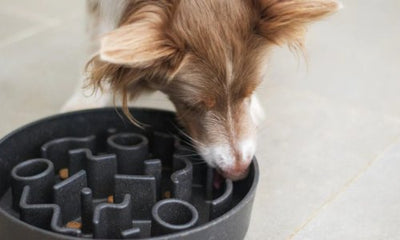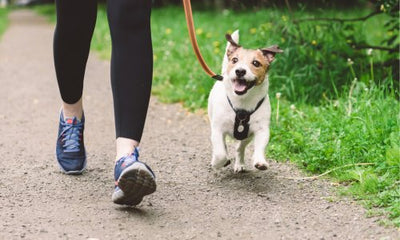Owning a dog is fun, and extremely rewarding! While a dog can be a wonderful addition to any home, keeping a dog is a huge commitment and responsibility as they have a complex set of needs. Whether you are an experienced pet owner or a first time pet parent, it is important to make sure you take the necessary steps to prioritise your dog’s health and happiness! Our pet experts have put together a comprehensive guide on how to care for your dog.
Purchasing a dog
When you decide to bring a new dog into your family, there are many things you will need to consider. Dogs come in various sizes, shapes and personalities, so it is important to do your research and find a dog whose needs match your ability and lifestyle. We highly recommend adopting a dog, if you are in a position to do so. Giving a dog another chance at life is a genuinely rewarding experience. To find out more about adopting, you can visit your local RSPCA. If adoption is not for you, we recommend purchasing a dog from a registered breeder. Don’t hesitate to ask local trainers, veterinarians and rescue organisations for advice on different breeds.
Veterinary care
Once you acquire a dog, you should book them into your local vet for a general health and wellbeing check. The needs of every dog are different depending on their size, age and breed, but your vet will be able to advise you on any necessary vaccinations, preventative healthcare, desexing and more. It is recommended that your dog is vaccinated for parvovirus, hepatitis, parainfluenza, distemper and bordetella. Your dog should also be microchipped, which will help locate them in the event they get lost.
Time and money
Before you bring a dog into your home, you should consider how much time, energy and money is needed to keep your dog in good physical and mental shape. You should be prepared to spend a lot of time with your dog, as an unhappy or bored dog is more likely to develop destructive or antisocial behaviours. In addition to this, you should consider the costs of food, registration, vet bills, vaccinations, preventative medicine, grooming, bedding, toys and more. On average, dogs live to fifteen years old, with some even living into their twenties, so bringing a puppy into your home is generally a 15-20 year commitment.
Water
Hopefully this point is quite obvious to most, but it is vital that dogs have clean, fresh water available at all times. This means purchasing a water dish and ensuring that this dish is cleaned regularly.
Food
Each dog has individual dietary requirements depending on his or her age, size, breed and activity level. Super-premium dry food such as Hill’s Science Diet, Royal Canin or Advance will provide your dog with a well balanced complete diet. Food should be offered once or twice a day. It is important to note that all super-premium foods have age specific diets for puppies and mature dogs to ensure their individual needs are being met. If you are unsure about what food to feed your dog, you should consult with your local veterinarian.
Training
Being a responsible pet parent means taking responsibility for training your dog. Training your dog is an ongoing duty, and we highly recommend reward-based training for dogs of all ages. Obedience training is vital for keeping your dog happy, healthy and safe as it can prevent mishaps such as them getting lost or running out on the road. It will lead to a happier and healthier pet (and owner)! If you need guidance on where to start with training your dog, we highly recommend speaking to a reputable dog training school who can provide advice on suitable classes.
Exercise
Dogs need regular exercise to stay fit and healthy, and provide stimulation. It helps avoid boredom, which can lead to destructive behaviours, and can satisfy your pet’s instinctual urges to dig, herd, chew, retrieve and chase. The amount and type of exercise needed will vary based on breed, sex and age, but most dog’s need to be walked regularly. This means you will need to allocate time to daily walks, as well as be willing to purchase a good quality collar, harness and lead. Don’t forget to fit your lead with poo bags and a poo bag dispenser incase of any accidents! In addition, you should purchase your dog some good quality, fun and stimulating toys to play with. This will help keep them occupied when they are alone.
Grooming
Regular grooming is essential, particularly for long-haired breed dogs. Grooming removes dust, loose hair, dead skin and knots or tangles. It will also help reduce the amount of hair your dog sheds, particularly during moulting season. You should invest in a brush that is suitable for your dog’s coat. In addition, some dogs can benefit from bathing. Bathing will remove any unwanted dirt and grime from the dog’s coat, so is particularly important for dogs who visit the beach regularly. When grooming your dog, be sure to check them over for fleas and ticks.
Housing
It is important that your dog has a warm, quiet place to rest and sleep. If your dog will be sleeping or spending long periods of time outdoors, they should have access to shade or shelter and a dog kennel with a bed or pillow. If they are sleeping indoors, they should have a comfortable dog bed or training crate. Be sure to wash the bedding often.
Identification
It is a legal requirement to register your dog with your local council. In addition, your dog should have an ID tag attached to their collar that clearly states their name and your contact number in case they go missing. Pet identification tags are extremely cheap to purchase and crucial for your pet’s wellbeing.
Parasites
All dog owners must be aware of common parasites that cause threat to their pet’s health and take the necessary steps to protect them. As well as undertaking daily inspection for fleas and ticks, dog owners should give their dog regular parasite protection to help prevent fleas, ticks, intestinal worms, heartworm, mites and mange. There are an overwhelming amount of options on the market, so we highly recommend speaking to your veterinarian to discuss the best option for you and your pet.
Dental Care
Dental health is just as important for dogs as it is for humans. You should regularly monitor your dog’s mouth for any abnormalities such as redness of gums or tartar build up, and schedule annual dental cleanings with your vet. In between cleanings, regular brushing can assist in keeping your pet’s teeth and gums healthier. You may also like to purchase some dental treats or dental toys to assist in the removal of plaque and tartar buildup.
We hope this guide helps give you an understanding of the basic needs of a dog. All information in our care guides are based upon our own experience, and in any medical situations, you should always consult your vet.
Dog Owners Checklist
- Super premium quality dog food
- Food dish
- Water dish
- Parasite protection
- Dog treats
- Stimulating dog toys
- Grooming brush
- Collar and lead
- Dog poo bags and poo bag dispenser
- Pet ID tag
- Pet carrier
- Dog bed
- Dog crate or kennel
- Dog toothbrush
- Dog pooper-scooper






